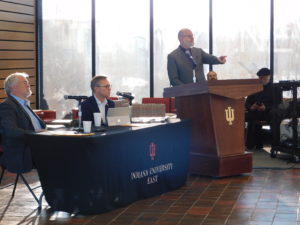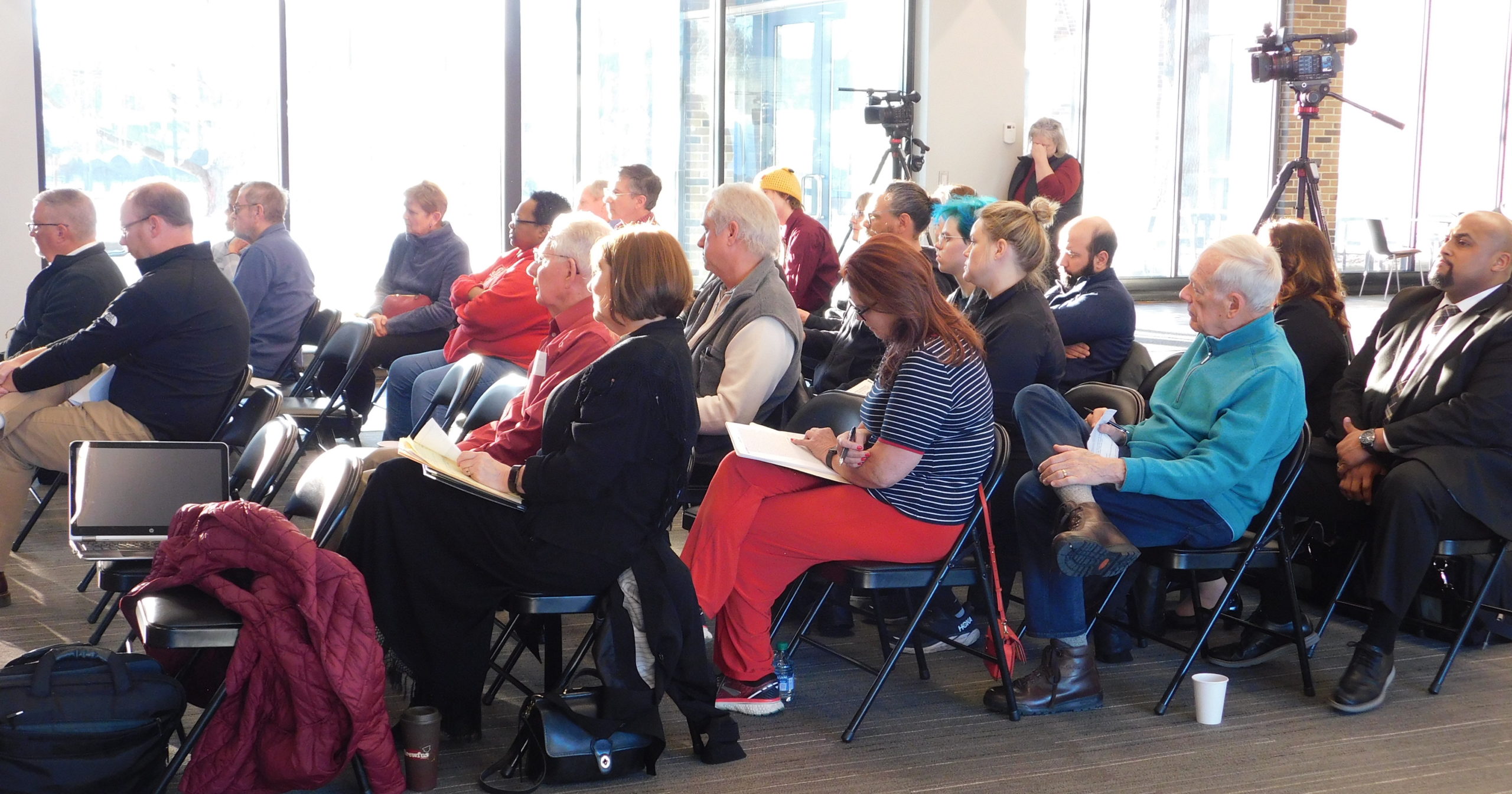Discussion covered ‘furries,’ gender, economic, health issues
Residents brought their questions and concerns to Friday’s legislative forum with Wayne County’s state lawmakers. Topics during the event at Indiana University East included “furries,” student safety, economic development tactics, historic preservation and the environment.
State Rep. Brad Barrett and State Sen. Jeff Raatz briefly described some challenges during their first few weeks in the legislative session, then took questions from the audience of more than 30 people.
Barrett leads his chamber’s public health committee, and Raatz oversees education and career development in the Senate. The two are busy vetting bills — Barrett noted nearly 90 affecting public health alone — before committee discussions, revisions and potential advancement to a floor vote.
Raatz said that residents have “good influence over there” because he and Barrett are in leadership roles.
At least 600 bills are working their way through the House, Barrett said, making it hard to know every detail. He said he appreciates hearing from residents about potential positive or negative local consequences so he knows which legislation he especially should watch.
Barrett said discussions about some bills get “blown out of proportion” if one line of a bill makes media headlines. Although lawmakers are focused on passing a two-year budget, the most vigorous conversations didn’t involve finances.
“Furries”
A teacher asked why Raatz authored Senate Bill 380 addressing “furries.” Raatz has said he believes children imitating animals in school is causing a disruption. The questioner said that behavior isn’t happening in schools, while mental health and poverty issues continue to impact students, and said Raatz is wasting time on an issue that doesn’t exist.
Raatz said he didn’t write the bill specifically about furries, but included a line as part of a broader bill that empowers schools to deal with dress codes. He said schools shouldn’t have to put up with students dressed inappropriately. Indiana state law already allows schools to set dress codes.
Raatz said he has received proof that furries are real but declined to share that evidence or name which school in his district is experiencing a disruption.
Gender identity
A transgendered student’s parent shared worries that a bill written by Raatz could impact the rights of his child and other marginalized students, even endangering them if upset parents turn violent.
He said he hoped lawmakers would see the humanity in those children before requiring schools to notify parents within five days if youth disclose a desire to change their “name, attire, pronoun, title or word to identify the student that is inconsistent with the student’s biological sex at birth.” Under the bill, parents also would have to be contacted if students express having “conflicted feelings about … or difficulty handling or coping with” their gender identity or gender expression.
Additional residents chimed in, saying that some students live in homes where they would not be safe if school staff had to “out” them.
Raatz said he’s not ignorant that there could potentially be issues at home, but said it’s primarily a parental rights and notification issue, because he believes schools cannot hide certain information from parents. The provision is in Senate Bill 354 about school accreditation.
If parents are antagonistic toward a child, “there are laws in place to take care of those things,” he said, but did not elaborate.
In response, audience members said Hoosiers can’t go to police and report a child being emotionally abused. They asserted that a political party focused on individual freedoms should extend those liberties to children and not step into relationships that families need to work out on their own.
“You’re saying it’s more important for a parent to know if their child is trans than for the child to be safe both mentally and physically,” one person responded to Raatz.
Additional commenters noted that school is supposed to be a safe place for students where they must build trust with staff before learning, and those relationships could be jeopardized if conversations must be reported. A school board member noted that the bill just adds to burdens placed on teachers who also might not be trained on how to handle student struggles with gender identity and expression.
Barrett said he has met with gender care staff at Riley Hospital for Children to learn about the work they do, that he aims to make decisions based on evidence, and that a lot of changes can still be made to the proposed bill.
Economic development
Concerns were raised about a bill that could negatively impact efforts to attract employers. It would end confidentiality about incentives being offered to prospective companies during negotiations. The questioner was concerned that Indiana would lose potentially interested companies to other states, but supported transparency after a deal is completed.
Another bill would prohibit incentives for ecommerce businesses, making distribution centers like Amazon less likely to locate here even after a major Interstate 70 investment.
Barrett said he will take those recommendations to heart. Raatz said he’s keeping an eye on other bills with potential local economic benefits, such as additional funding for Main Street communities because Wayne County has four, and tax credits for historic home rehabilitation.
Public health

One resident is hesitant about some recommendations made by Gov. Holcomb’s Public Health Commission as part of a $347 million investment over the next two years. The speaker disagreed with ideas such as potentially combining health departments in rural counties, and creating databases that share data with the federal government, which he believes could result in mandates.
Barrett, a retired surgeon, said some apprehension toward the proposal resulted from the pandemic. However, he sees the review as an 18-month, evidence-based evaluation that suggests how health could be improved for all Hoosiers.
During the pandemic, health officials realized two things, Barrett said. Overall health indicators for Hoosiers are not good, with life expectancy among the nation’s lowest, and spending has been very low to address a relatively unwell population. In addition, the health system was too stressed.
Barrett said not every county has a doctor or commissioner interested or educated in public health, and consolidation could capture talent. He noted that elected county officials oversee health departments. And, data would be general without identifying individuals, he said, describing its use to address an HIV outbreak in southern Indiana.
School board elections
One current officeholder doesn’t want to see school board elections become partisan, calling it a “bad idea” because voters would not be able to learn candidates’ school leadership philosophies just from a political label.
Flood plain maps
A bill would address perceived overreach by Indiana Department of Natural Resources maps that go beyond previous Federal Emergency Management Agency maps, making it harder to develop land. For instance, the town of Jacksonburg is largely impacted, so if a home burns down, it currently can’t be replaced. Raatz said he called the governor’s office Friday morning to raise awareness before legislation goes further because DNR is an executive branch agency. He said Wayne County is in the “dead center of what’s going on,” and Barrett confirmed a significant role for the county as a member of the Agriculture and Rural Development committee.
Energy
Regarding a concern about policy disincentives to adopting renewable energy technologies, Barrett and Raatz both indicated support for integrating wind, solar and other technologies as they develop, but expressed caution around ensuring stable and consistent delivery to local homes and businesses.
Whitewater Community Television will air the forum on Channel 11 at 9:30 p.m. Feb. 1, 9:30 a.m. Feb. 2, 4:30 a.m. Feb. 3, 3 p.m. Feb. 4 and on demand at WCTV.info.

